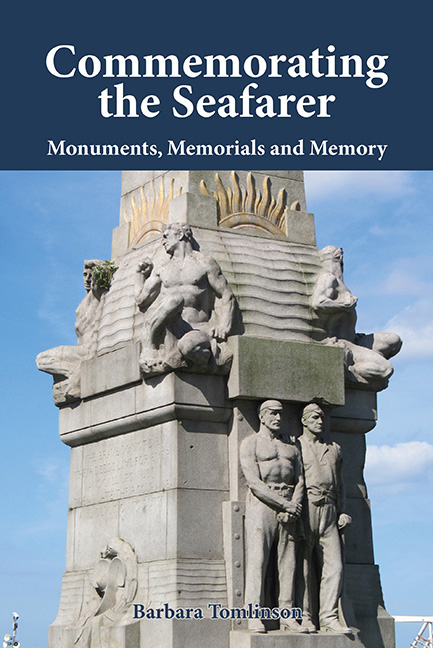Book contents
- Frontmatter
- Dedication
- Contents
- Illustrations
- Preface
- Acknowledgements
- Introduction
- 1 Shifting Loyalties: Naval Memorials, 1628–783
- 2 The Age of Heroes: Naval Memorials, 1783–815
- 3 Pax Britannica: Naval Memorials, 1815–914
- 4 Stormy Weather: Conflict and Sacrifice in the Twentieth Century
- 5 Commerce and Philanthropy: Mercantile Commemoration
- 6 Lost at Sea: Maritime Accidents
- 7 Maritime Explorers: Drake to Shackleton
- 8 Inshore: Fishermen, Lifesavers and Leisure
- Conclusion
- Bibliography
- Index
5 - Commerce and Philanthropy: Mercantile Commemoration
Published online by Cambridge University Press: 08 May 2021
- Frontmatter
- Dedication
- Contents
- Illustrations
- Preface
- Acknowledgements
- Introduction
- 1 Shifting Loyalties: Naval Memorials, 1628–783
- 2 The Age of Heroes: Naval Memorials, 1783–815
- 3 Pax Britannica: Naval Memorials, 1815–914
- 4 Stormy Weather: Conflict and Sacrifice in the Twentieth Century
- 5 Commerce and Philanthropy: Mercantile Commemoration
- 6 Lost at Sea: Maritime Accidents
- 7 Maritime Explorers: Drake to Shackleton
- 8 Inshore: Fishermen, Lifesavers and Leisure
- Conclusion
- Bibliography
- Index
Summary
Maritime trade and warfare have always been closely interrelated. Apart from defending coasts from invasion and projecting military power overseas, the role of navies is to protect sea-borne commerce, and the naval costs of doing so have generally been met through taxation on the profits of that trade. Until the early nineteenth century, crews, and to a lesser extent, officers, might have experience of service in both merchantmen and warships. Seamen tended to be reluctant naval recruits, pressed in wartime from incoming merchant ships in which they were often better paid, and resentful of harsher naval discipline. Large merchant ships, East Indiamen in particular, carried guns to fight off attacks by pirates or, more commonly, privateers. A tablet in the church of King Charles the Martyr in Falmouth commemorates an American passenger, Captain John Navarre Macomb of New York, who died of wounds sustained defending HM packet Princess Charlotte from attack by a French privateer, La Vénus, in 1810. Such packets were privately owned or hired vessels which carried passengers and mail on behalf of the Post Office. During that year Princess Charlotte was constantly engaged in carrying government despatches from Lisbon, a vital source of information on the progress of the Peninsular campaign against the French, which may explain her determined resistance to this attack.
A peaceful occupation?
There were, of course, peaceful and beneficial outcomes from maritime trade, generally seen in a positive light by the mid-eighteenth century (or at least its profits were so regarded). However, in remarking that ‘There are few ways in which a man can be more innocently employed than in getting money’, Samuel Johnson was mocking some of the social attitudes of his time. Military rank and achievement, allied to notions of aristocracy, patriotism and disinterested public service made possible by inherited wealth, had long had a cachet denied to more entrepreneurial activities. There was also a dark side to trade. Demands currently continue for the removal of Edward Cassidy's 1895 statue, at Bristol, of Edward Colston (1636–1721), merchant and philanthropist of that former slave-trading city – in which trade he was also involved as a member of the Royal African Company. Memorials which allude to personal wealth gained through commerce have therefore tended to deploy a degree of spin. New wealth would also come under scrutiny in a religious context, so fair-dealing and philanthropy are emphasized in epitaphs.
- Type
- Chapter
- Information
- Commemorating the SeafarerMonuments, Memorials and Memory, pp. 119 - 146Publisher: Boydell & BrewerPrint publication year: 2015



